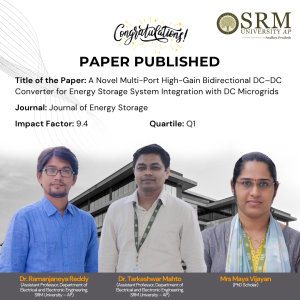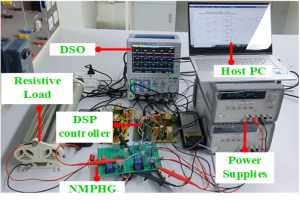 In a significant stride towards sustainable energy solutions, a team of researchers from the Department of Electrical and Electronic Engineering has unveiled a groundbreaking innovation. Their paper titled “A Novel Multi-Port High-Gain Bidirectional DC–DC Converter for Energy Storage System Integration with DC Microgrids” has been accepted in the prestigious Q1 Journal of Energy Storage, boasting an impressive impact factor of 9.4. The study focuses on addressing the critical challenges associated with energy storage systems (ESS) in direct current (DC) microgrids. Dr Ramanjaneya Reddy, Assistant Professor, Dr Tarkeshwar Mahto, Assistant Professor, and Mrs Maya Vijayan, a dedicated PhD Scholar, collaborated to design a multi-port high-gain bidirectional DC-DC converter. This innovative converter facilitates seamless integration of energy storage systems with DC microgrids, enhancing overall system efficiency and reliability.
In a significant stride towards sustainable energy solutions, a team of researchers from the Department of Electrical and Electronic Engineering has unveiled a groundbreaking innovation. Their paper titled “A Novel Multi-Port High-Gain Bidirectional DC–DC Converter for Energy Storage System Integration with DC Microgrids” has been accepted in the prestigious Q1 Journal of Energy Storage, boasting an impressive impact factor of 9.4. The study focuses on addressing the critical challenges associated with energy storage systems (ESS) in direct current (DC) microgrids. Dr Ramanjaneya Reddy, Assistant Professor, Dr Tarkeshwar Mahto, Assistant Professor, and Mrs Maya Vijayan, a dedicated PhD Scholar, collaborated to design a multi-port high-gain bidirectional DC-DC converter. This innovative converter facilitates seamless integration of energy storage systems with DC microgrids, enhancing overall system efficiency and reliability.
Abstract
Bidirectional converters have often been used in numerous applications like DC microgrids, renewable energy, hybrid energy storage systems, electric vehicles, etc. The paper proposes a novel multi-port high-gain (NMPHG) bidirectional DC-DC converter that supports DC microgrid (DC-MG) applications. The main contributions of the proposed converter are high step-up/step-down conversion gain, multiple input ports, lower switch voltage stress, and lower component count owing to the single converter with multiple input ports for DC microgrid applications.
The detailed operational principle, analysis, and design considerations of proposed NMPHG bidirectional DC-DC converters are discussed. Furthermore, the loss analysis, detailed comparison with similar works, and efficiency analysis with non-modalities during forward power flow (LV to HV) and reverse power flow (HV to LV) modes are presented. The efficiency of the proposed converter is found to be 93.8% in forward power flow and 92.9% in reverse power flow modes at rated power. Finally, a hardware prototype of the proposed NMPHG bidirectional DC-DC converter is implemented with 100 W in FPF mode and 200 W in RPF mode with a TMS320F28335 processor and validated with theoretical counterparts.
Explanation of Research in Layperson’s Terms
The proposed converter is a 200W bidirectional topology used in DC microgrid applications such as renewable energy, hybrid energy storage systems, and electric vehicles. The converter can accept two or more sources to supply the load. Thus, it is suitable for various applications of traction vehicles. It exhibits a lower switch stress and reduces the component ratings to lower values.
Title of Research Paper in the Citation Format
A NOVEL MULTI-PORT HIGH-GAIN BIDIRECTIONAL DC-DC CONVERTER FOR ENERGY STORAGE SYSTEM INTEGRATION WITH DC MICROGRIDS
Vijayan, Maya, Ramanjaneya Reddy Udumula, Tarkeshwar Mahto, and Ravi Eswar KM. “A novel multi-port high-gain bidirectional DC-DC converter for energy storage system integration with DC microgrids.” Journal of Energy Storage 87 (2024): 111431.
Practical Implementation or the Social Implications Associated with it
The features include port expandability on the source side, lower switch voltage stress, bidirectional property, and fewer components. It is most suitable for electric vehicles, Unmanned ariel vehicles, and energy storage systems at renewable power plants, etc. It improves the reliability of the grid system whereas hybrid energy storage systems with battery or supercapacitor will improve system stability.

It can be used in various on-grid and off-grid applications like hospitals, offices, and educational institutions, especially where energy backup is very important. These types of converters are more specific for use in fast power transition required such as EVs, drones, aircraft, space vehicles, etc. The major advantage is the reduction in the size of the converter due to multiple source capability and ease of control.
Future Research Plans
We plan to work on a bidirectional converter with better efficiency and ultra-high gain. That should be able to reduce the size of the converter and the source ratings too. Design and implement bidirectional multi-port converters for various applications of DC microgrids, such as renewable and hybrid storage integration.

